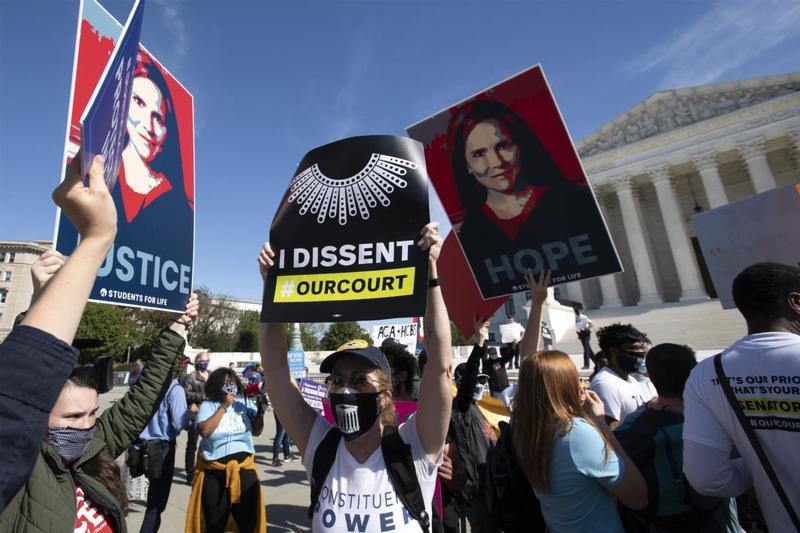 People protest for and against the confirmation of US President Donald Trump's Supreme Court nominee, Amy Coney Barrett, in rallies at the Supreme Court on Capitol Hill, in Washington, on Wednesday. (JOSE LUIS MAGANA / AP)
People protest for and against the confirmation of US President Donald Trump's Supreme Court nominee, Amy Coney Barrett, in rallies at the Supreme Court on Capitol Hill, in Washington, on Wednesday. (JOSE LUIS MAGANA / AP)
The Senate Judiciary Committee is poised to take the first steps toward approving United States President Donald Trump's Supreme Court nominee Amy Coney Barrett following two long days of Senate testimony.
Barrett's confirmation to take the seat of the late justice Ruth Bader Ginsburg seems inevitable, as even some Senate Democrats acknowledged in Senate hearings on Tuesday and Wednesday
In front of lawmakers, she stressed that she would be her own judge and sought to create distance between herself and past positions.
Barrett's confirmation to take the seat of the late justice Ruth Bader Ginsburg seems inevitable, as even some Senate Democrats acknowledged in Senate hearings on Tuesday and Wednesday. The shift would cement a 6-3 conservative majority on the court and would be the most pronounced ideological change in 30 years, from the liberal icon to the conservative appeals court judge.
READ MORE: Sudden Supreme Court vacancy reshapes US presidential race
After the two days of questioning, the judiciary panel was scheduled to start considering the nomination on Thursday. The meeting, which is a procedural formality, was expected to be held ahead of a panel of law experts and advocates who will testify for and against Barrett's nomination.
Senators were expected to discuss the nomination but then push the committee vote on Barrett until next week, per committee rules. Barrett will not be present.
Facing almost 20 hours of questions from senators, the 48-year-old judge was careful not to take on the president who nominated her and sought to separate herself from writings on controversial subjects when she was an academic. She skipped past Democrats' pressing questions about ensuring the date of next month's election or preventing voter intimidation, both set in federal law, and the peaceful transfer of presidential power.
ALSO READ: Trump nominates Barrett for US Supreme Court
Questions raised
She also refused to express her view on whether the president can pardon himself. "It's not one that I can offer a view," she said in response to a question on Wednesday from Democratic Senator Patrick Leahy.
Democrats raised those questions because Trump has done so himself.
When it came to major issues that are likely to come before the court, including abortion and healthcare, Barrett repeatedly promised to keep an open mind and said neither Trump nor anyone else in the White House had tried to influence her views.
"No one has elicited from me any commitment in a case," she said.
Nominees typically resist offering any more information than they have to, especially when the president's party controls the Senate, as it does now. But Barrett wouldn't engage on topics that seemed easy to swat away, including that only Congress can change the date that the election takes place.
She said she is not on a "mission to destroy the Affordable Care Act", though she has been critical of the two Supreme Court decisions that preserved key parts of the healthcare law brought in by Trump's predecessor, Barack Obama. She could be on the court when it hears the latest Republican-led challenge on Nov 10.
Agencies and Ai Heping in New York contributed to this story.


